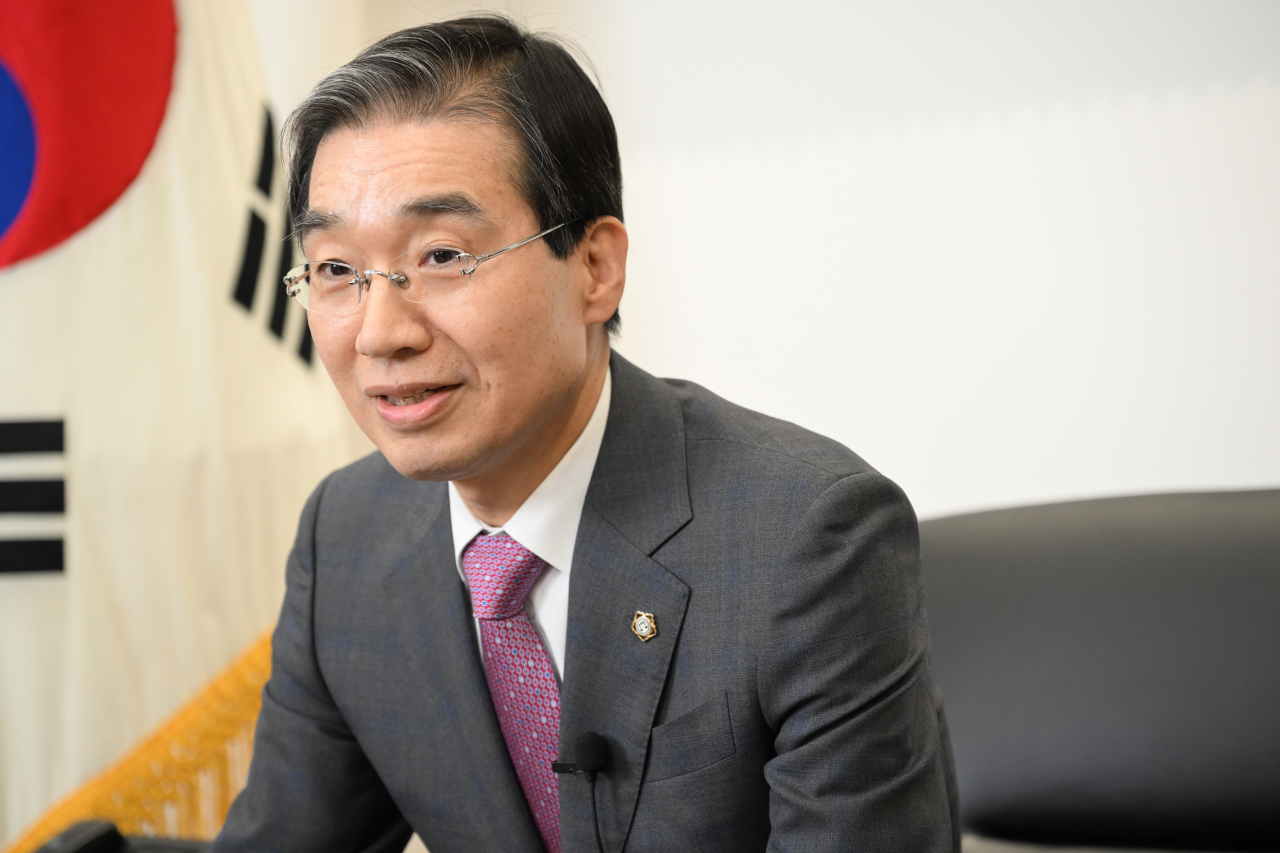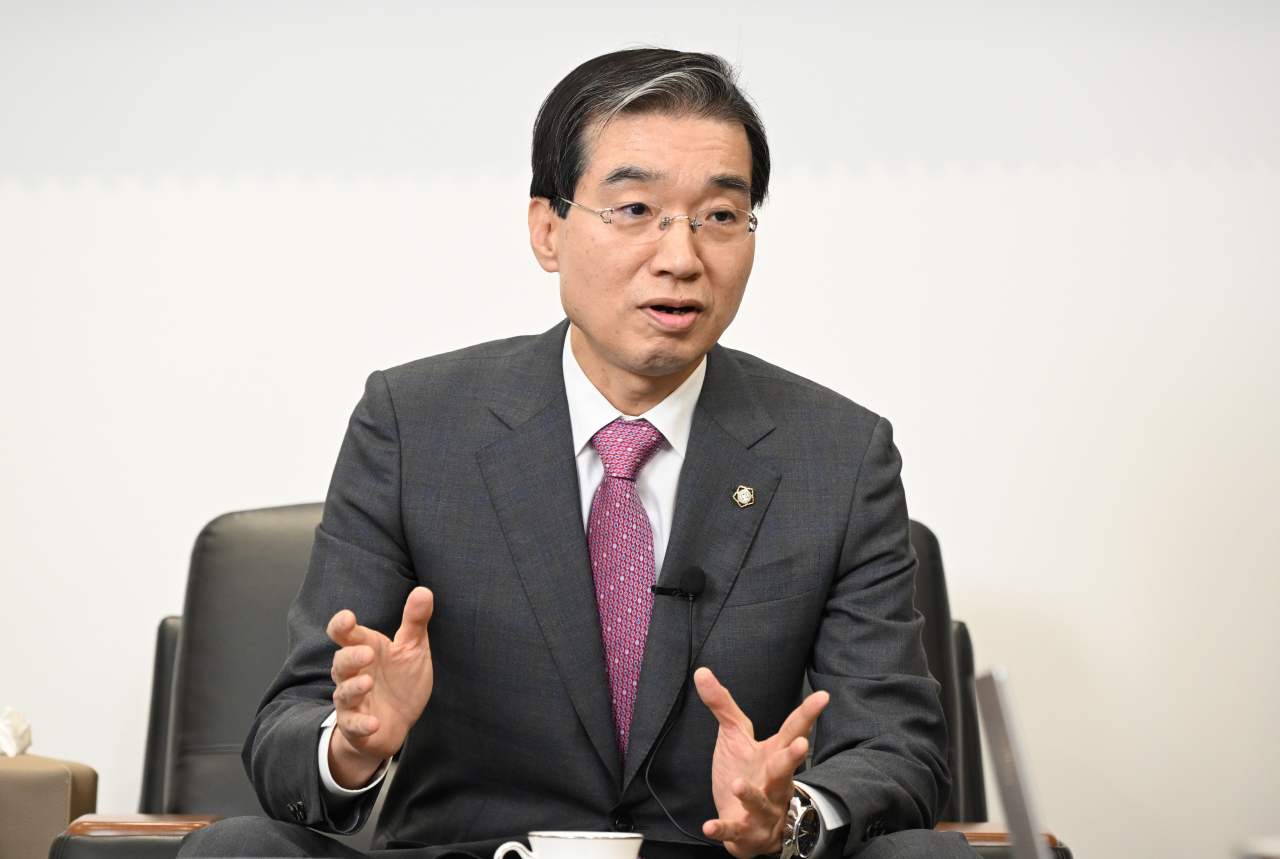[Herald Interview] Top attorney calls for stronger protection of foreigners, fairer trials
By Son Ji-hyoungPublished : Feb. 1, 2023 - 15:20

In the face of an increasingly globalized labor workforce and a looming demographic cliff, South Korean legal professionals are calling for stronger protection of immigrants' and refugees' human rights in the country.
"Refugees' and immigrants' human rights issues have gained ground in this society," Lee Jong-yop, president of the Korean Bar Association told The Korea Herald in a recent interview at the KBA headquarters in Seoul. During his tenure, Lee created a legal aid team for refugees under the special committee for foreign refugees and immigrants in February 2021.
In the KBA’s 2022 annual seminar examining five rulings that posed an "obstacle" to the advancement of Korea's judiciary system from the past year, one of the cases shed light on the challenges foreign workers face when being questioned by law enforcement and during court proceedings in Korea.
A 2021 ruling in a South Korean district court convicted a Sri Lankan man of causing a fire at an oil storage tank.
In 2018, the then-27-year-old Sri Lankan was a construction site worker who released a sky lantern that caused a nearby oil storage tank to catch fire in Goyang, Gyeonggi Province.
However, KBA research in 2022 showed that the man had suffered a cruel interrogation and insufficient interpretation and translation services. This also led to unwanted media exposure of his identity, and forced him into giving incriminating testimony against himself.
The ruling itself was also perceived as "transferring blame from the oil storage tank managers to a foreigner," according to the KBA. The convicted man flew back to his home country after paying a 10 million won ($8,130) fine with crowdfunded money.
Lee, who represents some 30,000 attorneys licensed in Korea, also raised the need to install a departure waiting facility outside Incheon Airport, where foreigners potentially facing repatriation are eligible to stay longer without worrying about legal problems.
The Ministry of Justice has operated a waiting center for foreigners inside the airport since August 2022 through a legal revision. The center had long been provided by the government and was run by private-sector entities, but had problems due to "unclear legal grounds," Lee said.
Even after the government’s regaining of control over the facility, further improvement is needed to ensure human rights protection for those who cannot enter Korea due to legal or administrative problems.
"It should be noted that the departure waiting center presupposes that foreigners are subject to stay for a short period before repatriation," Lee said.
"Yet, there may be cases where a foreigner may stay for a long time due to particular circumstances. ... To properly guarantee the human rights of vulnerable people, such as foreigners who are forced to wait for a long time and elderly people, it is critical to establish a facility where they can stay outside the airport."
Looming demographic cliff
In addition to its increasingly globalized workforce, Korea also faces a looming demographic cliff that necessitates more administrative support for foreigners entering and residing in Korea long term.
Korea’s fertility rate has declined for the past seven years in a row, standing at below 1 from 2018 to 2021. Those admitted to public elementary schools in the nation's most populous city of Seoul fell to an all-time low to below 70,000 this year.
"The demographic cliff is not a distant future but a reality just around the corner," Lee said.
"Because of a demographic cliff, enhancing the (national) population, whether it is through increasing the birth rate or immigration, is an urgent issue."
Lee welcomed Justice Minister Han Dong-hoon's declaration last week to set up a separate government agency dedicated to serving the specific needs of immigrants in the first half of this year.
"The KBA hopes to play a role in the formulation of specific procedures and setting the details of the agency’s plan," Lee said, adding the association has members who specialize in immigrant and refugee affairs.
Coordinating the functions related to foreign nationals in Korea scattered throughout different government bodies will not only boost consistency in policy for the vulnerable group of over 2 million immigrants, but also address Korea's own demographic problem.

Striving for fair, efficient court trials
Born in Incheon in 1968, Lee is a former prosecutor who started leading the advocacy group of attorneys here in February 2021.
The KBA president has the power to recommend candidates for Supreme Court judges, a prosecutor-general and the head of the national anticorruption agency, the Corruption Investigation Office for High-ranking Officials, among other key roles in Korea's judicial system. Lee will end his term as the president on Feb. 27, to be succeeded by his aide Kim Young-hoon.
When asked about his impression of the portrayal of courtroom scenes on Korean TV series such as "Extraordinary Attorney Woo," Lee said the popularity of such series stemmed from Koreans' desire for a fair court trial.
"I do believe that the structure of trials need to be changed to a judicial system in which they are carried out through fairer and equal-status procedures, rather than the current trial structure in which control of litigation proceedings is centralized on the judge from the beginning to the end of the trial," Lee said.
Concerning this, Lee has supported a range of legislation during his time as KBA president, such as having both plaintiffs and defendants know what evidence may be presented from the beginning of the trial, in what could be the Korean equivalent of the "discovery" process in the United States.
Lee was also working to prevent a longstanding practice of "jeon-gwan-ye-u," in which retired Supreme Court justices or prosecutor-generals are given preferential treatment in lawsuits. Courts would give them an upper hand in their debut court appearances as attorneys, regardless of the circumstances.
The need for the new legislation came under the spotlight as former Supreme Court Justice Kwon Soon-il had sought to set up a new law practice despite opposition from the KBA. Kwon managed to become an attorney-at-law because there was no specific legal ground restricting him from doing so.
"The current restriction period on accepting cases should be raised to three years from the current two years," Lee said.







![[Graphic News] More Koreans say they plan long-distance trips this year](http://res.heraldm.com/phpwas/restmb_idxmake.php?idx=644&simg=/content/image/2024/04/17/20240417050828_0.gif&u=)
![[KH Explains] Hyundai's full hybrid edge to pay off amid slow transition to pure EVs](http://res.heraldm.com/phpwas/restmb_idxmake.php?idx=644&simg=/content/image/2024/04/18/20240418050645_0.jpg&u=20240419100350)






![[From the Scene] Monks, Buddhists hail return of remains of Buddhas](http://res.heraldm.com/phpwas/restmb_idxmake.php?idx=652&simg=/content/image/2024/04/19/20240419050617_0.jpg&u=20240419175937)

![[KH Explains] Hyundai's full hybrid edge to pay off amid slow transition to pure EVs](http://res.heraldm.com/phpwas/restmb_idxmake.php?idx=652&simg=/content/image/2024/04/18/20240418050645_0.jpg&u=20240419100350)

![[Today’s K-pop] Illit drops debut single remix](http://res.heraldm.com/phpwas/restmb_idxmake.php?idx=642&simg=/content/image/2024/04/19/20240419050612_0.jpg&u=)